Trade distortion and protectionism
A call for openness in a time of lockdowns – and protectionism
Published 16 November 2021
Author, lecturer, and documentary filmmaker Johan Norberg faced a unique challenge in 2020. His new book "Open: The story of human progress" was due to publish in July, just as climbing coronavirus infections shut down cities and countries around the world. But to Norberg, the book’s rallying cry to celebrate trade and openness was even more relevant during this unprecedented period of isolation. Even during lockdowns, he argues, innovators raced to produce life-saving vaccines.
This interview is part of the Hinrich Foundation Future of Trade Interview series.
Recently, Norberg shared with the Hinrich Foundation his views on the challenges facing advocates of free trade and globalization, as protectionist policies mount across many regions. The interview with the award-wining writer, who is also a Senior Fellow at the Cato Institute in Washington DC and the European Centre for International Political Economy in Brussels, has been edited for clarity.
Q: What prompted you to write this book?
A: This book is my attempt to make sense of the world. I tend to veer between radical optimism and despair. It depends on whether I look at the progress that is being made every day among entrepreneurs, innovators, scientists. We continue to reduce poverty. We continue to come up with vaccines in a rapid period of time.
But whenever I look at politics, it's something completely different. Then it's just a zero-sum game, with people attacking one another, engaging in group warfare and engaging in a very closed mindset.
This is my attempt to understand both where our openness and our closed mindedness come from, and how they can shed light on many important periods of history. Why we made progress and why we sometimes mess it up.
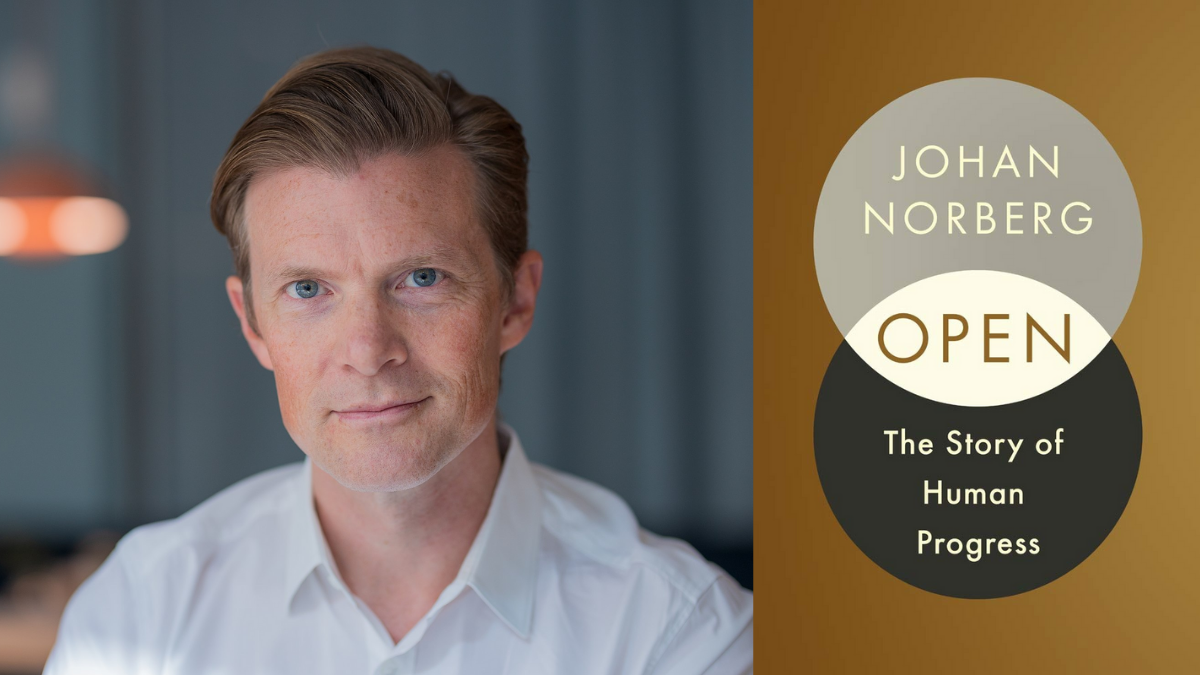 "Open: The story of human progress” was due to publish in July 2020, just as climbing coronavirus infections shut down cities and countries around the world.
"Open: The story of human progress” was due to publish in July 2020, just as climbing coronavirus infections shut down cities and countries around the world.
Q: What was the general response?
A: First of all, I'm overwhelmed by the positive reviews and lots of sales, lots of translations. On the other hand, I think many people also considered the book as a way of understanding defeat, of why openness is now not seen as positive. I was writing a book about openness in the middle of a pandemic! That gives a particular perspective to the whole issue.
Some people say, now globalisation is over. Now the world is closed, again, and that this is just an attempt to explain why that happened, rather than a rallying cry for openness in the future. That's disappointing to me, as the book is really an attempt to make people see the values of openness and why it's worth fighting for.
Q: Have you seen a change? Is there now more of a rallying cry or just more defeatism?
A: To me, the pandemic has been a disappointment. Obviously due to the human toll and the health toll. But also due to how people have reacted to the pandemic. They are saying, look, the outside world is dangerous, let's shut everything down. Let's try to repatriate supply chains because now it's dangerous to be dependent on supplies from the other side of the planet. Let’s retreat from free trade, and so on. There are also some authoritarian tendencies; people want to be protected by the strongman whenever they feel threatened.
On the other hand, this did not surprise me. Most of the book was written before the pandemic. One of the book’s conclusions was that, historically, crisis – an economic crisis, or a natural disaster, or a pandemic – tends to make us feel threatened. That triggers this societal fight or flight instinct in us, where we want to hide from the world or find scapegoats and attack.

Q: I feel that times of crises energize me to be even more optimistic. What else do you have? If not optimism in times of stress.
A: That is a very good point. Pessimism is not a strategy for surviving the world. Optimism is. I try to avoid being caught up in the events of the day. I tried to explain in Open that we always face natural disasters and pandemics and war and tragedies. This happens, and will happen again in the future.
The question is not should we feel pessimistic because crisis happens, but what can we do to deal with it. The response from scientists, engineers, and entrepreneurs has been overwhelmingly positive. What I see when I look at the pandemic is that we managed to come up with a vaccine and started to vaccinate people within a year of even learning about the virus, something that used to take 300 years for mankind. People are constantly working hard, comparing notes on the disease, because of the openness that's online - even though the physical world is shut up. Entrepreneurs continuously reroute supply chains to make sure that we don't starve, even when the world is shut down.
The pandemic has been terrible. But I wouldn't want to live in any other era to face a pandemic because our ways and our abilities to respond has been better than ever.
Q: You cited in the book even improvements in the protection of intellectual property rights in China, for example. Tell us more about these benefits of trade.
A: The basic argument for trade is simply that no man is an island. If we want to make use of more knowledge, ideas, imagination, hard work, we have to be open to it from other places. That's what we've seen historically. Countries and places that have been open to people and ideas, goods and services, have prospered because they suddenly have access to the brains of other people as well.
That's why trade creates more innovation, higher productivity, and more poverty reduction. Once that happens, trade also creates the ability for people to get along in a peaceful way. Make trade, not war. Historically, the only way to prosper from your neighbours was to attack them and take their stuff. Nowadays, we do it by specialising what we do best and trade for the rest with others. Obviously, that comes with lots of difficulties and problems, because we have different political systems and different rules for, say, state subsidies, or intellectual property rights.

What’s interesting is the change as countries grow. There are lots of reasonable complaints, for example, about companies investing in China, and suddenly, across the road, a Chinese factory is producing the same thing but a little bit cheaper. We have to put that in historical perspective. In the United States, it was official policy to bribe European craftsmen and businesses to reveal their secrets, despite harsh punishments at home.
The same went for Sweden. Many of our inventions were things that we picked up and stole from continental Europe or the United States. What changed was that as we grew richer and gained more education and capital, we became inventive. There was then more pressure to protect intellectual property rights. I am beginning to see this in China as well as in the US. The China Business Council regularly interviews American businesses about the status of China's protection of intellectual property rights. Over the past ten years, close to a majority said that the protection of intellectual property has increased since last year. That's what they say every year.
Something is changing there. Forced technology transfers is of concern, but only ranks as 24 out of 27 top challenges for US companies. That's partly because there are now many Chinese entrepreneurs who demand protection for their ideas, because they are becoming inventive.
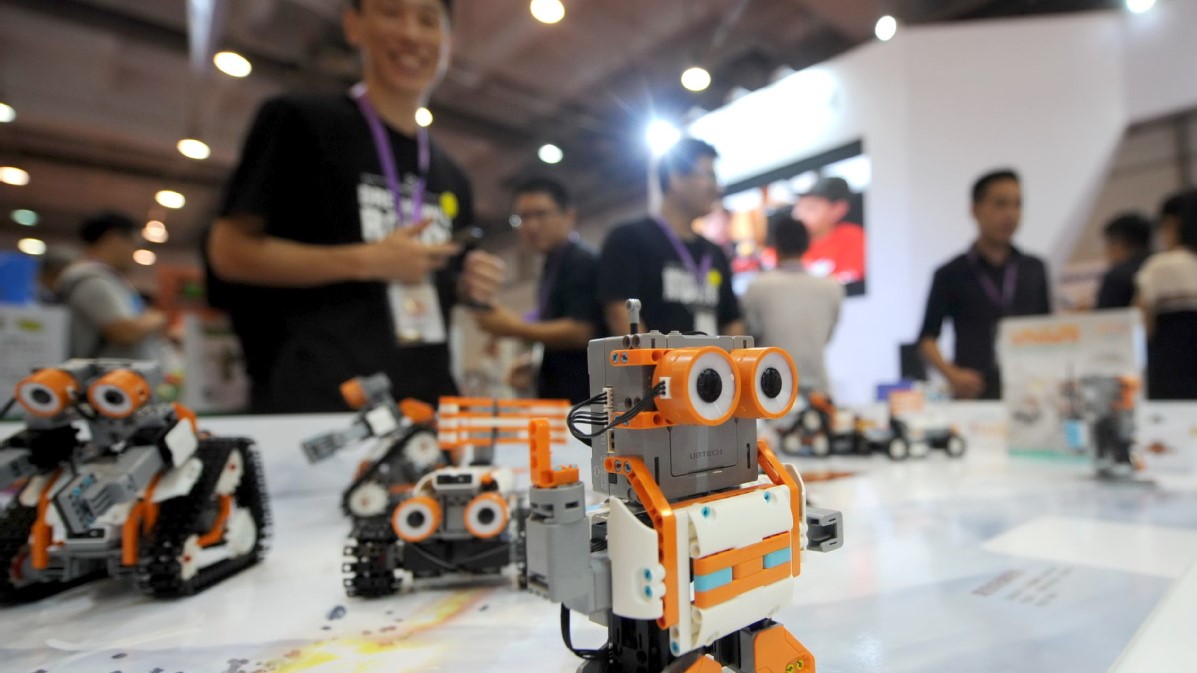 Many Chinese entrepreneurs are demanding protection for their ideas as they become inventive.
Many Chinese entrepreneurs are demanding protection for their ideas as they become inventive.
Q: At the same time, you describe civilization in general as tribalist. How can we live in an open world if we are inherently tribalist?
A: If we can't solve that, there's not much hope for us. There's both openness and tribalism within us. Homo sapiens got so far because we cooperated and made use of the ideas, from hunting and gathering in a better way to venturing out in space or reading the genome of a virus. It is possible because we can make use of the ideas and knowledge of others.
The problem is, historically, once we climbed to the top of the food chain, the only thing that could threaten us again was other groups of people who cooperated even better. We had to be a little bit concerned about what they were up to over there, the neighbours, that other tribe, that other nation. That's our tribalism.
Historically, it doesn't take much to trigger this – as anyone who's been to a sporting event knows. Watch soccer. Just having a different colored shirt means that you cheer for the wrong team. Therefore, we have to beat you up. Very small, almost arbitrary groupings can trigger this tribal mindset. That's worrying.
It is also the way out of the worst aspects of tribalism. We constantly shift groupings and see other cues that describe those in other groups as having something in common with us. We've gone from just being loyal to our kin, our tribe, the village, the nation. We now think that nationalism as sort of traditional, but that's a 19th century invention.
The key is to find out that we have many different circles of loyalty, I might be a Swede and therefore, historically, I might have been an enemy of the Norwegians, our neighbours. On the other hand, I can also see that we share an idea about open society and an open world. I can see there are Norwegians who also love playing tennis, who are interested in history and literature, and are fathers and mothers just like we are here. I have another circle of loyalty and empathy with them. Therefore, I should be able to get along with them.
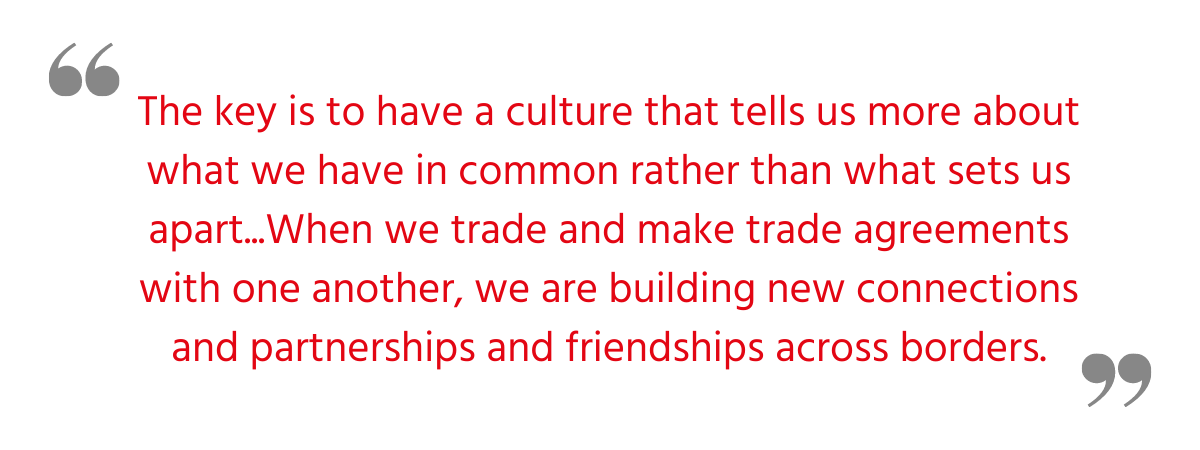
Tribalism is always there. It is pre-wired. However, the particular tribalism that we express, is very fluid, changes with the cultural atmosphere, and what our leaders say. The key is to have a culture that tells us more about what we have in common rather than what sets us apart.
Q: If that's the case, could that be applicable to, say, trade blocs. Can trade blocs be more creative in fashioning this culture that keeps the coalition together?
A: Absolutely. Historically, Sweden was a war-faring nation. The moment we had a chance, we invaded our neighbours. We were constantly at war with Denmark. But there was a group of people who opposed that. They lived in southern Sweden and northern Denmark and traded with one another. They constantly made secret peace agreements with one another because they wanted to exchange goods and services. We even had a saying: the oxen made peace because oxen going across the borders. People thought about how they could make use of the skills and the power of the neighbours rather than see them as a threat.
That's what we do when we trade and make trade agreements with one another. We are building new connections and partnerships and friendships across borders. That's not always enough to create harmonious relationships or even peace in the long run. But it's much better than the alternative – of looking at the neighbours through binoculars and knowing that anything they did that made them more powerful could be a threat. Now we know that when they come up with a new way of transmitting electricity or a treatment to a disease, that will save us as well.
Q: Dan Ikenson outlines, rightly so, that trade negotiators are always arguing for more exports and less imports. It goes back to that zero-sum mentality - if you have a gain that means less for us, right? That's a difficult mindset to change.
A: It is, it's very strange. It's like we are in a timeline where Adam Smith didn't exist and never wrote The Wealth of Nations. People do often instinctively think, yes it's good for us to work hard and sell lots of stuff to the others. But whenever we buy something, that makes us weak and vulnerable.
That's not how we work or think as individuals, is it? It's the other way around. Work might be a pleasure, but to lots of people, it would be nice to be able to work a little bit less and still be able to buy more things for that wealth. That's what increases your purchasing power and improves your life - being able to, in your individual life, export a little bit less to buy more stuff from other places. That's how you become wealthy.
That's what the classical economists taught us and that is still the very much the truth about the trading system. The benefit of trade comes from the goods that you import, not the ones you export – your export is what you pay to get those imports. It's so strange that everybody thinks that they protect themselves by not importing much, by imposing tariffs and quotas on the work of others. That only means that you have to work harder to access to things that you need.
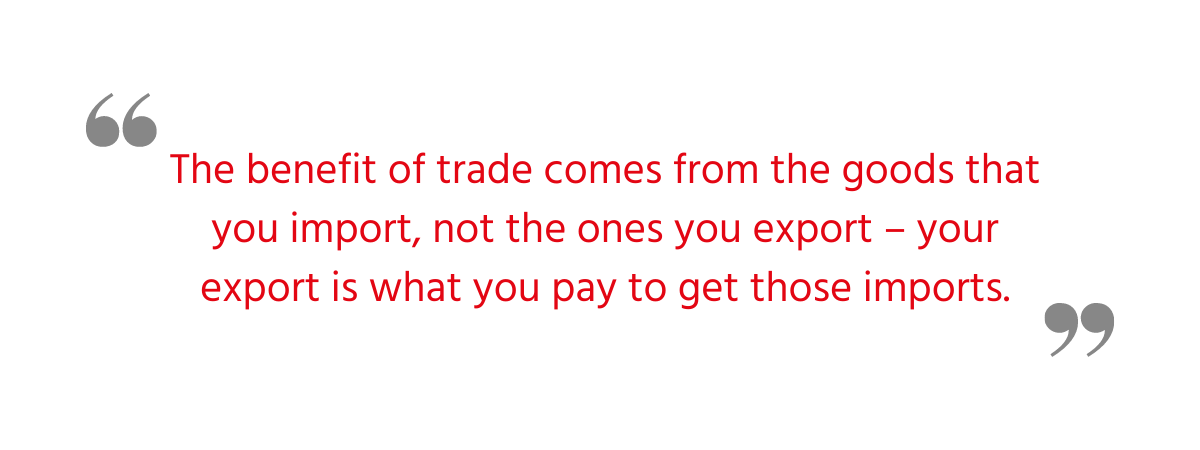
Q: It seems that governments are preferring self-harm rather than have their neighbours enjoy benefits as well.
A: We are in a period of tribalist and nationalist instincts. It has been triggered partly because the world is worrying right now – due to the last financial crisis, the pandemic, and a more uncertain geopolitical world. These are exactly the conditions that trigger this fear. Instinctively, it makes sense to hide away from this world. But that's irrational, because it means that, whatever is making people prosperous, you won't have access to that production, those ideas, and so on.
History is not always rational. We are not always rational. Whenever people try to impose more self-sufficiency and repatriate supply chains, this beggar-thy-neighbour policy triggers the same instinct in others. When Donald Trump does that in the US, that's a signal to Europeans, we should probably do that as well. Otherwise, he will hurt us and we won't hurt them back. We have the same tendency all over the world – India, China, other places. Where it will end up is an open question.
The countervailing forces are also strong. For all the worries about supply chains breaking down, only international cooperation helped us to get treatments and vaccines rapidly. Otherwise, we would not have access to personal protective equipment and so on. What saved China during the first Wuhan crisis was its ability to import two billion face masks from the rest of the world. When China emerged from the crisis and Europe suffered, Europe could import face masks from the factories that were reopening in China and East Asia.
If we count to ten and analyze what really happened, we can see clearly that openness in trade saved us. Openness made us more resilient than we would have been otherwise. The fight between open and closed goes on. But it intensifies right now because both sides think that they have stronger arguments than before the pandemic.
The problem is there might be a vicious spiral. You begin to protect yourself and create blocks on your road to innovation and productivity. That creates even more resentment and fear of the world. Then you retreat even more. That's very bad.
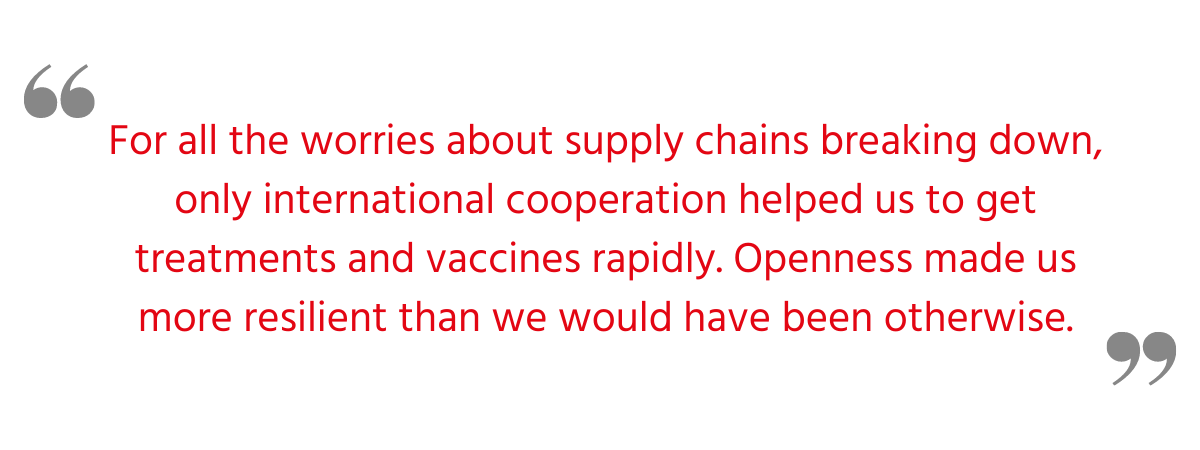
For a while at least, we have lost America as the leader of free trade around the world. It is no longer an engine for more market liberalisation. On the contrary, it has blocked much of the work in the WTO. It left the Trans-Pacific Partnership.
What makes me hopeful is that many of the countries that used to almost hide behind the great powers were already doing the right thing when America pushed forward with a new globalization agenda. This has focused minds and forced us to think about what happens in a world where we must take some responsibility. The fact that the Trans-Pacific Partnership went ahead without America with the CPTPP is a sign of that. The European Union's interest in making more trade agreements around the world is a sign of that as well.
In my hopeful moments, I think of an old saying by Samuel Johnson. "The prospect of being hanged in the morning focuses the mind tremendously," he said. Because now you must step up. It is the same with the international trading system. Right now, the prospect of the trading system being completely ruined must be focusing minds around the world.
To learn more about Johan Norberg's work, visit www.johannorberg.net
© The Hinrich Foundation. See our website Terms and conditions for our copyright and reprint policy. All statements of fact and the views, conclusions and recommendations expressed in this publication are the sole responsibility of the author(s).






